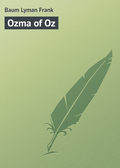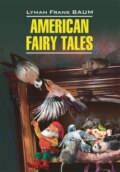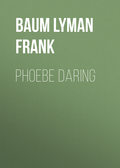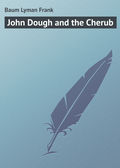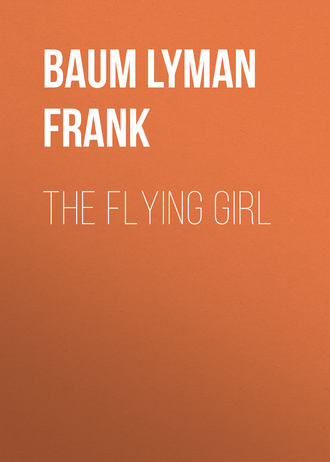
Лаймен Фрэнк Баум
The Flying Girl
CHAPTER VI
A BUCKING BIPLANE
Stephen Kane had scarcely slept a wink for three nights. When Orissa came home Thursday evening he met her at the car with the news that his aëroplane was complete.
“I’ve been adjusting it and testing the working parts all the afternoon,” he said, his voice tense with effort to restrain his excitement, “and I’m ready for the trial whenever you say.”
“All right, Steve,” she replied briskly; “it begins to be daylight at about half past four, this time of year; shall we make the trial at that hour to-morrow morning?”
“I couldn’t wait longer than that,” he admitted, pressing her arm as they walked along. “My idea is to take it into old Marston’s pasture.”
“Isn’t the bull there?” she inquired.
“Not now. Marston has kept the bull shut up the past few days. And it’s the best place for the trial, for there’s lots of room.”
“Let’s take a look at it, Steve!” she said, hastening her steps.
In the big, canvas covered shed reposed the aëroplane, its spreading white sails filling the place almost to the very edges. It was neither a monoplane nor a biplane, according to accepted ideas of such machines, but was what Steve called “a story-and-a-half flyer.”
“That is, I hope it’s a flyer,” he amended, while Orissa stared with admiring eyes, although she already knew every stick and stitch by heart.
“Of course it’s a flyer!” she exclaimed. “I wouldn’t be afraid to mount to the moon in that airship.”
“All that witches need is a broomstick,” he said playfully. “But perhaps you’re not that sort of a witch, little sister.”
“What shall we call it, Steve?” she asked, seriously. “Of course it’s a biplane, because there are really two planes, one being above the other; but it is not in the same class with other biplanes. We must have a distinctive name for it.”
“I’ve thought of calling it the ‘Kane Aircraft,’” he answered. “How does that strike you?”
“It has an original sound,” Orissa said. “Oh, Steve! couldn’t we try it to-night? It’s moonlight.”
He shook his head quickly, smiling at her enthusiasm.
“I’m afraid not. You’re tired, and have the dinner to get and the day’s dishes to wash and put away. As for me, I’m so dead for sleep I can hardly keep my eyes open. I must rest, so as to have a clear head for to-morrow’s flight.”
“Shall we say anything to mother about it?”
“Why need we? It would only worry the dear woman unnecessarily. Whether I succeed or fail in this trial, it will be time enough to break the news to her afterward.”
Orissa agreed with this. Mrs. Kane knew the airship was nearing completion but was not especially interested in the venture. It seemed wonderful to her that mankind had at last learned how to fly, and still more wonderful that her own son was inventing and building an improved appliance for this purpose; but so many marvelous things had happened since she became blind that her mind was to an extent inured to astonishment and she had learned to accept with calm complacency anything she could not comprehend.
Brother and sister at last tore themselves away from the fascinating creation and returned to the house, where Steve, thoroughly exhausted, fell asleep in his chair while Orissa was preparing dinner. He went to bed almost immediately after he had eaten and his sister also retired when her mother did, which was at an early hour.
But Orissa could not sleep. She lay and dreamed of the great triumph before them; of the plaudits of enraptured spectators; of Stephen’s name on every tongue in the civilized world; and, not least by any means, of the money that would come to them. No longer would the Kanes have to worry over debts and duebills; the good things of the world would be theirs, all won by her brother’s cleverness.
If she slept at all before the gray dawn stole into the sky the girl was not aware of it. By half past four she had smoking hot coffee ready for Steve and herself and after hastily drinking it they rushed to the hangar.
Steve was bright and alert this morning and declared he had “slept like a log.” He slid the curtains away from the front of the shed and solemnly the boy and girl wheeled the big aëroplane out into the garden. By careful manipulation they steered it between the trees and away to the fence of Marston’s pasture, which adjoined their own premises at the rear. To get it past the fence had been Steve’s problem, and he had arranged to take out a section of the fencing big enough to admit his machine. This was now but a few minutes’ work, and presently the aëroplane was on the smooth turf of the pasture.
They were all alone. There were no near neighbors, and it was early for any to be astir.
“One of the most important improvements I have made is my starting device,” said Steve, as he began a last careful examination of his aircraft. “All others have a lot of trouble in getting started. The Wright people erect a tower and windlass, and nearly every other machine uses a track.”
“I know,” replied Orissa. “I have seen several men holding the thing back until the motors got well started and the propellers were whirling at full speed.”
“That always struck me as a crude arrangement,” observed her brother. “Now, in this machine I start the motor whirling an eccentric of the same resisting power as the propeller, yet it doesn’t affect the stability of the aëroplane. When I’m ready to start I throw in a clutch that instantly transfers the power from the eccentric to the propeller – and away I go like a rocket.”
As he spoke he kissed his sister and climbed to the seat.
“Are you afraid, Steve?” she whispered, her beautiful face flushed and her eyes bright with excitement.
“Afraid! Of my own machine? Of course not.”
“Don’t go very high, dear.”
“We’ll see. I want to give it a thorough test. All right, Ris; I’m off!”
The motors whirred, steadily accelerating speed while the aëroplane trembled as if eager to dart away. Steve threw in the clutch; the machine leaped forward and ran on its wheels across the pasture like a deer, but did not rise.
He managed to stop at the opposite fence and when Orissa came running up, panting, her brother sat in his place staring stupidly ahead.
“What’s wrong, Steve?”
He rubbed his head and woke up.
“The forward elevator, I guess. But I’m sure I had it adjusted properly.”
He got down and examined the rudder, giving it another upward tilt.
“Now I’ll try again,” he said cheerfully.
They turned the aircraft around and he made another start. This time Orissa was really terrified, for the thing acted just like a bucking broncho. It rose to a height of six feet, dove to the ground, rose again to plunge its nose into the turf and performed such absurd, unexpected antics that Steve had to cling on for dear life. When he finally managed to bring it to a halt the rudder was smashed and two ribs of the lower plane splintered.
They looked at the invention with dismay, both silent for a time.
“Of course,” said Steve, struggling to restrain his disappointment, “we couldn’t expect it to be perfect at the first trial.”
“No,” agreed Orissa, faintly.
“But it ought to fly, you know.”
“Being a flying machine, it ought to,” she said. “Can you mend it, Steve?”
“To be sure; but it will take me a little time. To-morrow morning we will try again.”
With grave faces they wheeled it back into the garden and the boy replaced the fence. Then back to the hangar, where Steve put the Kane Aircraft in its old place and drew the curtains – much as one does at a funeral.
“I’m sure to discover what’s wrong,” he told Orissa, regaining courage as they walked toward the house. “And, if I’ve made a blunder, this is the time to rectify it. To-morrow it will be sure to fly. Have faith in me, Ris.”
“I have,” she replied simply. “I’ll go in and get breakfast now.”
CHAPTER VII
SOMETHING WRONG
All that day Orissa was in a state of great depression. Even Mr. Burthon noticed her woebegone face and inquired if she were ill. The girl had staked everything on Steve’s success and until now had not permitted a doubt to creep into her mind. But the behavior of the aircraft was certainly not reassuring and for the first time she faced the problem of what would happen if it proved a failure. They would be ruined financially; the place would have to be sold; worst of all, her brother’s chagrin and disappointment might destroy his youthful ambition and leave him a wreck.
Somehow the girl managed to accomplish her work that day and at evening, weary and despondent, returned to her home. When she left the car her step was slow and dragging until Steve came running to meet her. His face was beaming as he exclaimed:
“I’ve found the trouble, Ris! It was all my stupidity. I put a pin in the front elevator while I was working at it, and forgot to take it out again. No wonder it wouldn’t rise – it just couldn’t!”
Orissa felt as if a great weight had been lifted from her shoulders.
“Are you sure it will work now?” she asked breathlessly.
“It’s bound to work. I’ve planned all right; that I know; and having built the aircraft to do certain things it can’t fail to do them. Provided,” he added, more soberly, “I haven’t overlooked something else.”
“Are the repairs completed, Steve?”
“All is in apple-pie order for to-morrow morning’s test.”
It was a dreadfully long evening for them both, but after going to bed Orissa was so tired and relieved in spirit that she fell into a deep sleep that lasted until Steve knocked at her door at early dawn.
“Saturday morning,” he remarked, as together they went out to the hangar. “Do you suppose yesterday being Friday had anything to do with our hard luck?”
“No; it was only that forgotten pin,” she declared.
Again they wheeled the aircraft out to Marston’s pasture, and once more the girl’s heart beat high with hope and excitement.
Steve took a final look at every part, although he had already inspected his work with great care. Then he sprang into the seat and said:
“All right, little sister. Wish me luck!”
The motor whirred – faster and faster – the clutch gripped the propeller, and away darted the aircraft. It rolled half way across the pasture, then lifted and began mounting into the air. Orissa stood with her hands clasped over her bosom, straining her eyes to watch every detail of the flight.
Straight away soared the aircraft, swift as a bird, until it was a mere speck in the gray sky. The girl could not see the turn, for the circle made was scarcely noticeable at that distance, but suddenly she was aware that Steve was returning. The speck became larger, the sails visible. The young aviator passed over the pasture at a height of a hundred feet from the ground, circled over their own garden and then began to descend. As he did so the aircraft assumed a rocking motion, side to side, which increased so dangerously that Orissa screamed without knowing that she did so.
Down came the aëroplane, reaching the earth on a side tilt that crushed the light planes into kindling wood and a mass of crumpled canvas. Steve rolled out, stretched his length upon the ground, and lay still.
The sun was just beginning to rise over the orange grove. The deathly silence that succeeded the wreck of the aircraft was only broken by the irregular, spasmodic whirr of the motors, which were still going. Orissa, white and cold, crept in among the debris and shut down the engines. Then, slowly and reluctantly, she approached the motionless form of her brother.
To be alone at such a time and place was dreadful. A few steps from Steve she halted; then turned and fled toward the garden in sudden panic. Away from the horrid scene her courage and presence of mind speedily returned. She caught up a bucket of water that stood in the shed and lugged it back to the pasture.
Was Steve dead? She leaned over him, dreading to place her hand upon his heart, gazing piteously into his set, unresponsive face.
Pat – pat – patter!
A rush across the springing turf.
What was it?
Orissa straightened up, yelled like an Indian and made a run for the fence that did full credit to her athletic training.
For Marston’s big bull was coming – a huge, tawny creature with a temper that would shame tobasco. He swerved as if to follow the fleeing girl, but then the draggled planes of the aircraft defied him and he changed his mind to charge this new and unknown enemy – perhaps with the same disposition that Don Quixote attacked the windmill.
Orissa shrieked again, for the enormous beast bounded directly over Steve’s prostrate body and with bowed head and tail straight as a pointer dog’s rushed at the aëroplane. The sails shivered, collapsed, rolled in billows like the waves of the ocean, and amid them the struggling bull went down, tangled himself in the wires and became a helpless prisoner.
The girl, who was sobbing hysterically, heard herself laugh aloud and was inexpressibly shocked. The bull bellowed with rage but was so wound around with guy-wires that this was the extent of his power. Turning her eyes from the beast to Steve she gave a shout of joy, for her brother was sitting up and rubbing his leg with one hand and his head with the other, while he stared bewildered at the wreck of his aëroplane, from which the head of the bull protruded.
Orissa ran up, wringing her hands, and asked:
“Are you much hurt, dear?”
“I – I’ve gone crazy!” he answered, despairingly. “Seems as if the aircraft was transformed into the mummy of a – a – brute beast! Don’t laugh, Ris. Wh – what’s wrong with me – with my eyes? Tell me!”
She threw herself down upon the grass and laughed until she cried, Steve’s reproachful glances having no particle of effect in restraining her. When at last she could control herself she sat up and wiped her eyes, saying:
“Forgive me, dear, it’s – it’s so funny! But,” suddenly grave and anxious, “are you badly hurt? Is anything – broken?”
“Nothing but my heart,” he replied dolefully.
“Oh; that!” she said, relieved.
“Just look at that mess!” he wailed, pointing to the aircraft. “What has happened to it?”
“The bull,” she answered. “But don’t be discouraged, dear; the thing flew beautifully.”
“The bull?”
“No; the aircraft. But as for the bull, I’m bound to say he did his best. How in the world shall we get him out of there, Steve?”
“I – I think I’m dazed, Ris,” he murmured, feeling his head again. “Can’t you help me to – understand?”
So she told him the whole story, Stephen sighing and shaking his head as he glared at the bull and the bull glared at him. Afterward the boy made an effort to rise, and Orissa leaned down and assisted him. When he got to his feet she held him until he grew stronger and could stand alone.
“I’m so grateful you were not killed,” his sister whispered. “Nothing else matters since you have so miraculously escaped.”
“Killed?” said Steve; “why, it was only a tumble, Ris. But the bull is a more serious complication. I suppose the aircraft was badly damaged, from what you say, before the bull got it; but now it’s a hopeless mess.”
“Oh, no,” she returned, encouragingly. “If he hasn’t smashed the motor we won’t mind the rest of the damage. Do you think we can untangle him?”
They approached the animal, who by this time was fully subdued and whined apologetically to be released. Steve got his nippers and cut wire after wire until suddenly the animal staggered to his feet, gave a terrified bellow and dashed down the field with a dozen yards of plane cloth wound around his neck.
“Good riddance!” cried Orissa. “I don’t think he’ll ever bother us again.”
Steve was examining the wreck. He tested the motors and found that neither the fall nor the bull had damaged them in the least. But there was breakage enough, aside from this, to make him groan disconsolately.
“The flight was wonderful,” commented his sister, watching his face anxiously. “Nothing could work more perfectly than the Kane Aircraft did until – until – the final descent. What caused the rocking, Steve?”
“A fault of the lateral balance. My automatic device refused to work, and before I knew it I had lost control.”
She stood gazing thoughtfully down at the wreck. Her brother had really invented a flying machine, of that there was no doubt. She had seen it fly – seen it soar miles through the air – and knew that a certain degree of success had been obtained. There was something wrong, to be sure; there usually is with new inventions; but wrongs can be righted.
“I’ve succeeded in a lot of things,” her brother was saying, reflectively. “The engines, the propeller and elevator are all good, and decided improvements on the old kinds. The starting device works beautifully and will soon be applied to every airship made. Only the automatic balance failed me, and I believe I know how to remedy that fault.”
“Do you suppose the machine can be rebuilt?” she asked.
“Assuredly. And the automatic balance perfected. The trouble is, Orissa, it will take a lot more money to do it, and we’ve already spent the last cent we could raise. It’s hard luck. Here is a certain fortune within our grasp, if we could perfect the thing, and our only stumbling block is the lack of a few dollars.”
Having reviewed in her mind all the circumstances of Steve’s successful flight the girl knew that he spoke truly. Comparing the aircraft with other machines she had seen and studied at the aviation meet she believed her brother’s invention was many strides in advance of them all.
“The question of securing the money is something we must seriously consider,” she said. “In some way it will be raised, of course. But just now our chief problem is how to get this ruin back to the hangar.”
“That will be my job,” declared Steve, his courage returning. “There are few very big pieces left to remove, and by taking things apart I shall be able to get it all into the shed. The day’s doings are over, Ris. Get breakfast and then go to your work. After I’ve stored this rubbish I’ll take a run into town myself, and look for a job. The aviation jig is up – for the present, at least.”
“Don’t do anything hurriedly, Steve,” protested the girl. “Work on the aircraft for a day or two, just as if we had money to go ahead with. That will give me time to think. To-night, when I come home, we will talk of this again.”
CHAPTER VIII
MR. BURTHON’S PROPOSITION
Saturday was a busy day at the office. They did not close early, but rather later than on other days, and Orissa found plenty of work to occupy her. But always there remained in her thoughts the problem of how to obtain money for Steve, and she racked her brain to find some practical solution.
Mr. Burthon was in a mellow mood to-day. Since the sale of his mining stock he had been less abstracted and moody than before, and during the afternoon, having just handed Orissa several deeds of land to copy, he noticed her pale, drawn face and said:
“You look tired, Miss Kane.”
She gave him one of her sweet, bright smiles in payment for the kindly tone.
“I am tired,” she returned. “For two mornings I have been up at four o’clock.”
“Anyone ill at home?” he asked quickly.
“No, sir.”
Suddenly it occurred to her that he might assist in unraveling the problem. She turned to him and said:
“Can you spare me a few minutes, Mr. Burthon? I – I want to ask your advice.”
He glanced at her curiously and sat down in a chair facing her.
“Tell me all about it,” he said encouragingly. “Not long ago it was I asking for advice, and you were good enough to favor me. Now it is logically your turn.”
“My brother,” said she, “has invented an airship.”
He gave a little start of surprise and an eager look spread over his face. Then he smiled at her tolerantly.
“All the world has gone crazy over aviation,” he remarked. “I, myself, witnessed the flights at Dominguez Field and became strongly impressed with the desire to fly. I suppose your brother contracted the fever, too, and has made a model he thinks will float in the air.”
“Oh, it is not a model,” she gravely replied. “Stephen is an expert mechanic and has worked on many of the most famous aëroplanes in the country. He has recently built a complete airship of his own, and this morning I watched him make a very successful flight in it.”
“Indeed?” he exclaimed, the eager look returning. “There is money in a good airship, Miss Kane. This is the psychological moment to forge ahead in aviation, which will soon become the world’s popular mode of transit. It is easy to build an airship; yes. Perhaps I could build one myself. But where many will try, many will fail.”
“And some will succeed,” she added, smiling.
He examined her expressive face with interest.
“Please tell me all about it,” said he.
So Orissa gave him the history of the aircraft, from its conception to the final triumph and wreckage and its conquest by the bull. Incidentally she told how they had mortgaged their home and the orange crop to get the needed money, and finally explained the condition they were now in – success within their grasp, but no means of taking advantage of it.
Mr. Burthon was very attentive throughout, his eyes fixed upon Orissa’s lovely face and watching its shades of anxiety and exaltation as the story progressed. While she enthusiastically described Steve’s aircraft, her eyes sparkling and a soft flush mantling her cheeks, the man scarcely heard what she said, so intent was he in admiring her. He did not permit his fair secretary to notice his mood, however, and the girl was too earnestly engaged to heed her employer’s intent gaze. At the conclusion of her story she asked:
“Tell me, sir, is there any way in which we can raise the money required?”
Mr. Burthon roused himself and the hard business expression settled upon his features again.
“I think so,” he returned, slowly. “What your brother needs is a backer – what is called an ‘angel,’ you know – who will furnish the necessary funds for the perfection of the invention and to place it upon the market and properly exhibit it.”
“Would anyone do that?” she inquired.
“For a consideration, yes. Such a party would demand an interest in the invention, and a share of the profits.”
“How much, sir?”
“Perhaps a half interest.”
She considered this statement.
“That is too much to give away, Mr. Burthon. The aircraft is already built and tested. It is a proved success, and the best aëroplane in all the world. Why should we give a half interest in return for a little money?”
He hesitated; then replied coldly:
“Because the invention is useless without the means to publicly demonstrate it, and establish it on a paying basis. At present your airship is without the slightest commercial value. Once exploited, the half interest you retain would make your fortune.”
Her brow wrinkled with a puzzled look.
“I’ll talk to Steve about it,” she said. “But, if he consents, where could I find such an – an ‘angel’?”
“In me,” he answered coolly. “If, on investigation, I find your brother’s airship to be one half as practical as you represent it, and doubtless believe it to be, I will deposit ten thousand dollars in the bank to exploit it – in return for a half interest – and agree to furnish more money whenever it is required.”
“Thank you, sir,” said Orissa, doubtfully. “I – I’ll talk with my brother.”
“Very well,” he replied. “But beware of confiding in strangers. I am your friend, and will guard your interests faithfully. Talk with your brother, but with no one else.”
Orissa did talk with Steve, that very evening, and the boy frowned at the suggestion just as his sister had done.
“I know that is the way business men do things,” he said, “and it’s a good deal like robbery. Burthon sees that we must have money, and he’s driving a shrewd bargain. Besides that, I’m not sure he’s honest.”
“I don’t see how he could defraud us, though,” mused Orissa. “There are two things for us to consider. One is, whether we can raise the money in any other way; and then, whether a half interest in a business with plenty of money behind it would not pay better than the whole thing, with a constant struggle to make both ends meet.”
“Perhaps it might,” he replied, hesitatingly. “But I’ve done all this alone, so far, and I hate to let anyone else reap the benefit of my ideas. I suppose if I had not proved the thing, but merely begun work on it, Burthon wouldn’t have invested a dollar in it.”
“I suppose not,” she agreed. “But think it over, dear. We have all day to-morrow to talk of it and consider what is best to be done. Then, when I go to the office Monday morning, I can tell Mr. Burthon our decision.”
They talked considerably more on this subject after dinner, and worried over it during a sleepless night. After breakfast on Sunday morning they went quietly to church, Mrs. Kane accompanying them, as was her custom. But Orissa had hard work to keep her mind on the service and Steve found the attempt impossible. The return home, including a long car ride, was passed in silence, and then Orissa had to busy herself over the dinner.
It was the middle of the afternoon before brother and sister found time to meet in the hangar, which was now strewn with parts of the aircraft. Steve looked around him gloomily and then seated himself beside Orissa upon a bench.
“I suppose we must settle this thing,” he said; “and there’s no doubt we must have money, or we shall face ruin. The thing has cost too much for us to withdraw from it without a heavy loss that would mean privation and suffering for you and mother. If we go to anyone but Burthon we may not get as good an offer as he makes, for men with money are eager to take advantage of a poor fellow in need. I can’t blame Burthon much. I don’t suppose there’s a rich man living who wouldn’t hold us up in the same selfish way. And so – ”
He paused, shrugging his shoulders.
“So you think we’d better accept Mr. Burthon’s proposition and give him a half interest?” she asked.
“Beg pardon,” said a cold voice; “am I intruding?”



